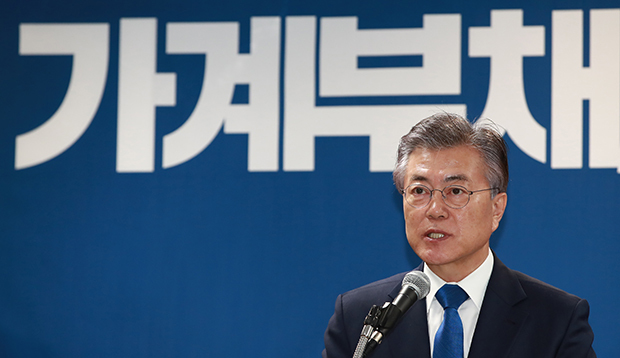The ongoing increase of household debt brings focus on whether President Moon Jae-in will manage to fulfill his pledge of curbing swelling household debt, which has long been a drag on South Korea’s economy.
Household borrowing from lenders in Asia’s fourth-largest economy rose 7.3 trillion won ($6.5 billion) in April, according to preliminary data from the Financial Services Commission on Monday.
The monthly increase was sharper compared to the previous month. The volume of debt rose 5.5 trillion won in March. The FSC pointed to an increase in “collective mortgage,” which enables a real estate buyer to go through an installment plan with loans extended by commercial banks. It said in the release that seasonalities, such as more home buying at this time of the year, had increased household debt.
The volume of household financing from January to April in 2017 soared 22.5 trillion won. If combined with the data as of 2016, the accumulated household debt in South Korea reaches 1366,8 trillion won as of April.
Household borrowing from lenders in Asia’s fourth-largest economy rose 7.3 trillion won ($6.5 billion) in April, according to preliminary data from the Financial Services Commission on Monday.
The monthly increase was sharper compared to the previous month. The volume of debt rose 5.5 trillion won in March. The FSC pointed to an increase in “collective mortgage,” which enables a real estate buyer to go through an installment plan with loans extended by commercial banks. It said in the release that seasonalities, such as more home buying at this time of the year, had increased household debt.
The volume of household financing from January to April in 2017 soared 22.5 trillion won. If combined with the data as of 2016, the accumulated household debt in South Korea reaches 1366,8 trillion won as of April.

The FSC, however, said it saw signs of the increase in lending settling down in the financing industry overall -- commercial banks, cooperative banks, savings banks and insurance firms.
On-year, the volume of debt increase was 1.7 trillion won lower in April, and 4.4 trillion lower from January to April.
The financial watchdog said the slowdown appears to be driven by the rate hikes, its strengthened guidelines on credit reviews and regulations to manage risks it had rolled out since last year.
Snowballing household debt has long been considered an issue in South Korea’s economy.
Analysts and policymakers have said that deregulation in 2014 triggered the surge in household debt. The Park Geun-hye administration had raised the bar for the loan-to-value ratio and debt-to-income ratio on the real estate market, which determine the maximum amount of mortgages. Under the eased regulation, a home buyer could borrow up to 70 percent of their property value and 60 percent of their income for mortgage payments, up 10-20 percent from before the deregulation.
The move was aimed to stimulate the domestic economy by encouraging more people to buy real estate assets, but it was soon blamed for the household debt reaching an unprecedented level. Household debt topped 1,000 trillion won for the first time in 2013, and reached 1,344.3 trillion won in three years.
The volume of debt was more than 1.5 times larger than disposable income as of September 2016, according to latest data from the Bank of Korea.
On-year, the volume of debt increase was 1.7 trillion won lower in April, and 4.4 trillion lower from January to April.
The financial watchdog said the slowdown appears to be driven by the rate hikes, its strengthened guidelines on credit reviews and regulations to manage risks it had rolled out since last year.
Snowballing household debt has long been considered an issue in South Korea’s economy.
Analysts and policymakers have said that deregulation in 2014 triggered the surge in household debt. The Park Geun-hye administration had raised the bar for the loan-to-value ratio and debt-to-income ratio on the real estate market, which determine the maximum amount of mortgages. Under the eased regulation, a home buyer could borrow up to 70 percent of their property value and 60 percent of their income for mortgage payments, up 10-20 percent from before the deregulation.
The move was aimed to stimulate the domestic economy by encouraging more people to buy real estate assets, but it was soon blamed for the household debt reaching an unprecedented level. Household debt topped 1,000 trillion won for the first time in 2013, and reached 1,344.3 trillion won in three years.
The volume of debt was more than 1.5 times larger than disposable income as of September 2016, according to latest data from the Bank of Korea.

President Moon Jae-in had pledged to keep the debt-to-disposable income ratio under 150 percent. But Kim Sang-jo, key economic adviser to Moon during his presidential campaign, said the 150 percent figure is not “an absolute guideline to lenders,” merely implying the new government aims to relieve household debt through a mixture of monetary and fiscal policies, as well as the tightening of the loan-to-value and debt-to-income ratios and a possible debt write-off for ordinary people.
“(The figure) signals the change of policy direction from deregulation to ‘soft landing’ of the household debt issue,” Kim said Monday, as quoted by Yonhap News Agency.
But he suggested the new administration will not tighten the loan-to-value and debt-to-income ratios in the near future.
“Finding those who have trouble repaying debts is the priority,” he said. “It is a more vital issue than tightening the LTV and DTI ratio.”
By Son Ji-hyoung (consnow@heraldcorp.com)
“(The figure) signals the change of policy direction from deregulation to ‘soft landing’ of the household debt issue,” Kim said Monday, as quoted by Yonhap News Agency.
But he suggested the new administration will not tighten the loan-to-value and debt-to-income ratios in the near future.
“Finding those who have trouble repaying debts is the priority,” he said. “It is a more vital issue than tightening the LTV and DTI ratio.”
By Son Ji-hyoung (consnow@heraldcorp.com)







![[KH Explains] How should Korea adjust its trade defenses against Chinese EVs?](http://res.heraldm.com/phpwas/restmb_idxmake.php?idx=644&simg=/content/image/2024/04/15/20240415050562_0.jpg&u=20240415144419)











![[Today’s K-pop] Stray Kids to return soon: report](http://res.heraldm.com/phpwas/restmb_idxmake.php?idx=642&simg=/content/image/2024/04/16/20240416050713_0.jpg&u=)